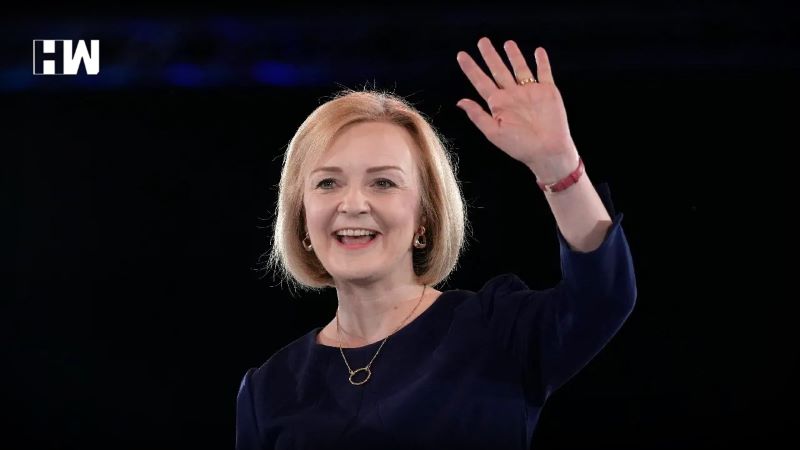
After an internal party contest, Britain gets its third prime minister in just over three years as the ruling Conservative Party announced Monday it has chosen Liz Truss to be its new leader.
Truss replaces Boris Johnson, a controversial maverick who defied many of Britain’s political traditions. Johnson resigned in July after senior members of his government turned against him amid a series of scandals connected to breaking his own coronavirus lockdown rules and waning appetite for his brand of populist politics.
Because Britain elects a party, not a specific leader, the party in power has some scope to swap in a new prime minister. Truss was selected by about 172,000 grassroots members of the Conservative Party. That figure represents less than 1% of the U.K.’s 67 million population.
The new prime minister takes office Tuesday and assumes power as household energy bills in the U.K. soar to unaffordable levels for millions of people.
In a brief speech, Truss thanked Johnson.
“Boris, you got Brexit done. You crushed Jeremy Corbyn, you rolled out the vaccine. And you stood up to Vladimir Putin. You were admired from Kyiv to Carlisle.”
Truss won 81,326 votes to Sunak’s 60,399, or 57% to 43%.
Truss, 47, has sought to portray herself as the political heir to Margaret Thatcher, Britain’s “Iron Lady” and first female leader who advocated with zeal for free markets, lower taxes and the privatization of large state enterprises from telecoms to energy. Truss served in Johnson’s government, first as a trade minister and then as foreign secretary. She has taken a hardline stance on Russia over its invasion of Ukraine.
“The thread that runs through Truss’s career is a belief in small government,” Daniel Hannan, a former Conservative party politician, wrote in an opinion piece published on his website. Hannan is now known as Lord Hannan of Kingsclere in the House of Lords, the unelected upper House of Parliament to which he was appointed by Johnson.
Sunak, 42, served in Johnson’s government as finance minister, where he oversaw a multi-billion dollar coronavirus support package for businesses and workers. His campaign struggled to shake off the perception, anathema to Conservative political ideology, that he presided over a big state intervention during the coronavirus pandemic. It was aimed at warding off mass unemployment and an economic depression.
Political experts say Britain’s new leader is unlikely to usher in major changes to the U.K.’s foreign policy that would upend its close relationship with the White House. But one possible flashpoint that Truss inherits from Johnson is what to do with the border between Northern Ireland, part of the U.K., and Ireland, part of the European Union, as a result of the U.K.’s departure from the European Union, known as Brexit.
This previously open border is now subject to checks on some goods and services and Conservatives want to change the customs and immigrations rules at the risk, say U.S. and European officials, of damaging the fragile peace that’s existed in Northern Ireland since the U.S.-brokered Good Friday Agreement took effect in1998.
“Truss is a full-throated Atlanticist, as is Sunak, who thinks that the U.K. is the keystone NATO partner,” said Matt Beech, director of the Center for British Politics, University of Hull, England, referring to close U.S.-U.K. security cooperation.
The first order of business for Truss will be to reassure the British public that she has a plan to deal with rapidly increasing energy costs and an inflationary spiral caused by the lingering coronavirus pandemic, Russia’s unprovoked war in Ukraine and Britain’s almost two-year-old exit from the EU bloc. All three events have disrupted supply chains and led to higher consumer costs.
The U.K. uses little oil and gas supplied by Russia, but by next month the typical British household is expected to pay around $4,200 a year to heat and power a home, according to Ofgem, Britain’s energy regulator. That’s an 80% annual rise and reflects the way the British government has engineered its energy market to be reliant on wholesale prices, which have skyrocketed amid the war in Ukraine.
Forecasts suggest U.K. energy bills could reach more than $7,700 early next year, more than many U.K. residents pay for rent or a mortgage and threatening to trigger so-called fuel poverty for millions and force many small businesses to close.
“Unless the government steps in there will be a social catastrophe,” independent personal finance expert Martin Lewis told a BBC radio program recently.
“How (Truss) reacts to the energy crisis will not only have a direct impact on the lives of U.K. citizens and the survival of many businesses, but also affect perception of the competence of the administration,” said Antony Froggatt, an environmental policy expert at Chatham House, a London-based think tank.
“It is a baptism by fire.”
As part of the hand over of power, Queen Elizabeth will receive Johnson and Truss at Balmoral, her estate in Scotland, on Tuesday, Buckingham Palace said.
It is a break from tradition. Normally the queen would host the departing and new British leaders at her London residence, which she has done 15 times before during her 70-year reign. In recent months the monarch, 96, has participated in fewer royal duties.